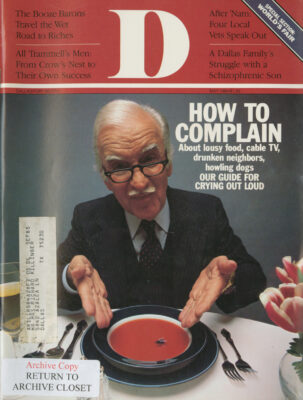SECURING A LOCAL liquor wholesale business or beer distributorship is similar to trying to get a membership at the Dallas Country Club-you just about have to inherit it. Many of the liquor and beer wholesalers in Dallas have been in the business since the city voted wet in 1935, and ownerships have been passed down from father to son to grandson. Needless to say, such well-established business channels leave little room for new blood in the liquor and beer industry. In fact, one could easily compare the acquisition of a liquor wholesale business or beer distributorship to being elected to Congress: Stay out of trouble, keep your nose to the grindstone, and you’re set for life.
The last time a beer distributorship changed hands in Dallas, for instance, was in 1980, when Miller Brewing Co. dumped its distributor (B Inc., a.k.a. Billy Bob Bar-nett and partners). When Miller, whose Lite Beer has made it the third largest distributor in Dallas, terminated its agreement with B Inc., it signed on Corpus Christi businessmen Tom White and Barry Andrews as the proud new owners. The thought of losing the distributorship so tormented Barnett that he angrily responded with a lawsuit that dragged on for nearly three years.
In 1976, when Raymond Willie Jr.-the largest stockholder of Willow Distributors, the Dallas Coors Beer distributor-and his wife, Brooksie, decided to divorce, Brooksie didn’t want to part without taking some of the stock with her. Court documents reveal that at the time of the divorce, Willie’s 45 percent interest for the first 10 months of fiscal year 1976 had netted him a $157,000 stock dividend, on top of his $45,000 salary and a $150,000 bonus. The distributor’s total sales during those 10 months were nearly $28 million. After some ugly courtroom battles, Brooksie got her fair share of her former hubby’s Colorado Kool-Aid business: The judge awarded her half the stock and Willie promptly changed the name of the distributorship from Willowbrook to Willow.
In Dallas, there are a dozen or so major liquor wholesalers and beer distributors who are the locally designated industry middlemen. Much the same way an automotive parts distributor links the oil filter manufacturer with the auto parts store, the liquor and beer wholesalers are the link between U.S. distilleries and breweries and the local package store. But since the liquor industry is so heavily regulated by the state and federal governments, the process of distributing a liter of booze or six-pack of beer is quite different from wholesaling an oil filter. For starters, liquor laws don’t allow interlocking ownerships among distilleries, wholesalers and retailers.
The distinctions don’t end there. For example, if a liquor wholesaler wants to add a new line to his business, he naturally wants to impress a retailer with the new product. But by law, his salesmen can’t even carry samples of the new product to prospective buyers. Say the liquor distributor wants to offer a discount on the new product to a certain retailer who could help him build a demand for the new line. He can’t. By law, the distributor must offer the same discount to every retailer. Until a few years ago, a wholesaler couldn’t even assist a retailer in stocking his shelves or setting up a display for his product.
Although buying on credit is common in today’s business world, credit extensions are forbidden when the commodities are liquor, beer or wine. If a retailer buys a case of liquor or wine from a wholesaler before the 16th of the month, the entire balance is due on the 25th of that month. If a retailer fails to pay, his name is placed on a list compiled by the Texas Alcoholic Beverage Commission (TABC), and he is not entitled to purchase liquor from any other distributor in the state. Similarly, when a beer truck makes its delivery to the local package store or nightclub, the entire bill must be paid at that time.
Contrary to what you might have heard, the terms “local option” and “wet/dry” are not dirty words to Dallas wholesalers. In fact, Dallas wholesalers save handily on transportation costs, since they only need to deliver their liquor and beer to one of the 12 J.P. precincts in Dallas County and Addison (see map). The fact that Dallas County is only partially wet merely serves to make the liquor, beer and wine business here a seller’s market. “People come to the beer rather than the beer going to the people,” says Bullitt Fitzhugh, president of Central Beverage Inc. If you doubt that, try to find a parking place at a package store in Addison or on Greenville Avenue near Meadow Road on any weekend.
Although any Dallas wholesaler is technically licensed to distribute his liquor statewide, wholesalers generally stay in their areas, which are assigned by agreement with the distilleries and breweries. “We stay in our own back yards, since we don’t want to get each other riled up,” says Jay Bratcher, president of Arlington-based Longhorn Liquors.
We should all have such back yards.
Get our weekly recap
Brings new meaning to the phrase Sunday Funday. No spam, ever.
Related Articles

Arts & Entertainment
DIFF Documentary City of Hate Reframes JFK’s Assassination Alongside Modern Dallas
Documentarian Quin Mathews revisited the topic in the wake of a number of tragedies that shared North Texas as their center.
By Austin Zook

Business
How Plug and Play in Frisco and McKinney Is Connecting DFW to a Global Innovation Circuit
The global innovation platform headquartered in Silicon Valley has launched accelerator programs in North Texas focused on sports tech, fintech and AI.

Arts & Entertainment
‘The Trouble is You Think You Have Time’: Paul Levatino on Bastards of Soul
A Q&A with the music-industry veteran and first-time feature director about his new documentary and the loss of a friend.
By Zac Crain


